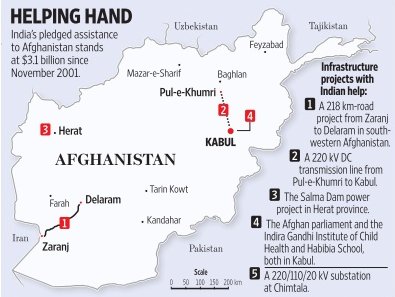International Relation: India-Afghanistan Relations
 India & Afghanistan have a strong relationship based on historical & cultural links. Since time immemorial, people of Afghanistan and India have interacted with each other through trade and commerce, peacefully coexisting on the basis of their shared cultural values and commonalities.
India & Afghanistan have a strong relationship based on historical & cultural links. Since time immemorial, people of Afghanistan and India have interacted with each other through trade and commerce, peacefully coexisting on the basis of their shared cultural values and commonalities.
- In 1999, India became one of the key supporters of the anti-Taliban Northern Alliance.
- In 2005, India proposed Afghanistan’s membership in the SAARC.
- Recently, Prime Minister Narendra Modi was conferred with Afghanistan’s highest civilian honour, the Amir Amanullah Khan Award.
- India has been favouring an Afghan led and Afghan-owned peace process.
India’s Contribution
- India is the sixth largest donor to Afghanistan in diverse development projects – education, agriculture, infra
- India has contributed close to $ 2 billion untied funds in infrastructure development in Afghanistan
- Zaranj to Delaram road project for facilitating movement of goods and services to the Iranian border
- 220kV DC transmission line from Pul-e-Khumri to Kabul
- Construction of Afghan-India Friendship Dam (Salma Dam) in Herat province
- Construction of Afghan Parliament
Strategic Significance of Afghanistan
- Afghanistan is gateway to energy rich central Asia & situated at crossroads between South Asia & Middle East
- Afghanistan has significant oil and gas reserves and has rich source of rare earth materials
- Stable government in Kabul is essential to reduce terror activities across south Asia & in J & K
- India was the first country Afghanistan chose to sign a strategic partnership agreement with, despite the U.S. and Pakistan keen on doing so
- India donated three Mi-25 attack helicopters to Afghanistan as part of the bilateral strategic partnership to counter the Taliban
- The massive reconstruction plans for the country offer a lot of opportunities for Indian companies.
- It has also signed the TAPI pipeline project that aims to bring natural gas from Turkmenistan through Afghanistan and Pakistan to India
- In the absence of transit route through Pakistan, India depends on other countries, including Iran, to send goods to Afghanistan even though it increases time and costs for Indian exporters.
- Hence, Recently India and Afghanistan inaugurated a dedicated air freight corridor service. It will provide Afghanistan, a landlocked country, greater access to markets in India.
- India is also cooperating with Afghanistan and Iran for development of the Chahbahar Port which provides an alternative route to Afghanistan and Central Asia.
- India hosted the 6th Ministerial Conference of Heart of Asia at which the Amritsar Declaration was adopted. It called for immediate elimination of terrorism to help Afghanistan in its political and economic transition.
Global Conference on Afghanistan in Russia
- To discuss ways of ending conflict in Afghanistan and establish durable peace
- Moscow invited Iran, Pakistan, India, China and five Central Asian States
- Russia’s pursuit of “great power” status + growing concern over terrorism and narcotic drugs pushed it to enter the Afghan conflict
- Russia believes the Taliban is a “legitimate stakeholder” in the conflict that must be engaged,& and is “lesser evil” than Islamic State/Da’esh forces in Afghanistan; & established links with the Taliban to coordinate efforts against Daesh in Afghanistan.
- By supporting the Taliban, Russia intends to strengthen barriers to US interests in the region. Moreover Russia also reminds the West not to ignore Moscow’s interests in discussions of the Afghanistan agenda at regional & international platforms.
- Chinese interest in Afghan reconciliation stems not only from a security/terrorism angle but also more significantly to ensure the sustainability of OBOR given its importance in providing access to Central Asia.
- India supports an Afghan led and Afghan owned national reconciliation process within the framework of the Afghan constitution.
- India took a hard line, opposing the dominant view from Russia, China and Pakistan to involve the Taliban in reconciliation efforts.
- Russia’s support to the Taliban will have numerous implications for the future of Afghanistan. It will weaken the central government in Kabul, which may result in the situation like Syria.
 India & Afghanistan have a strong relationship based on historical & cultural links. Since time immemorial, people of Afghanistan and India have interacted with each other through trade and commerce, peacefully coexisting on the basis of their shared cultural values and commonalities.
India & Afghanistan have a strong relationship based on historical & cultural links. Since time immemorial, people of Afghanistan and India have interacted with each other through trade and commerce, peacefully coexisting on the basis of their shared cultural values and commonalities.

No comments:
Post a Comment